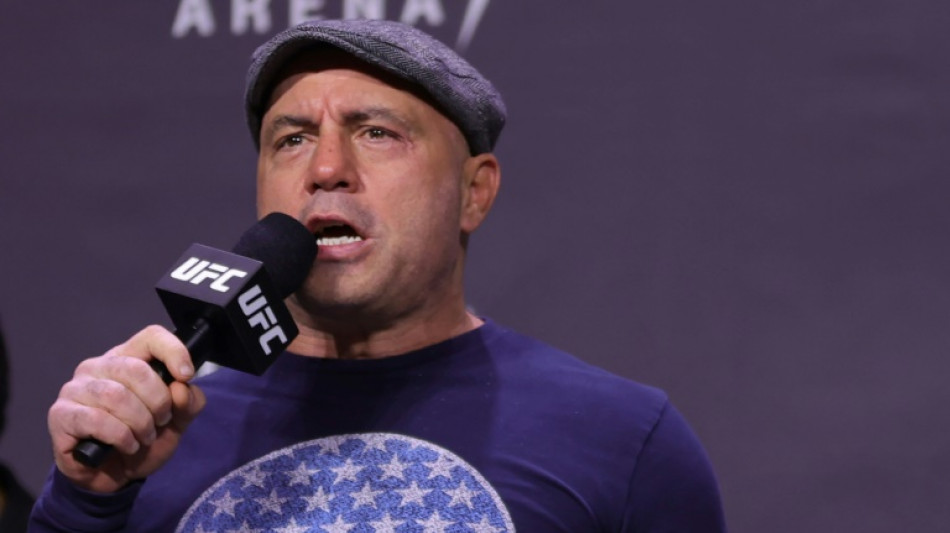
RBGPF
0.1600


US podcast star Joe Rogan, who has been called out by music legends Neil Young and Joni Mitchell for spreading Covid-19 disinformation on the hugely popular Spotify streaming service, is as enthralling as he is provocative.
At 54, the former taekwondo champion has millions of fans, who appreciate his outspokenness, his iconoclastic ideas, and the variety of his guests.
But he also has many detractors, starting with luminaries Young and Mitchell, who removed their music from Spotify in protest at its hosting of Rogan's podcast.
He has spread disinformation about the coronavirus and other topics on the air. Both musicians said the false claims, and Spotify's failure to do anything about them, was the reason for their decision.
R&B singer India Arie followed suit, citing what she said were Rogan's "problematic" comments on race.
For his accusers, he is particularly dangerous because his show "The Joe Rogan Experience," which has been broadcast exclusively on Spotify since 2020 under a deal worth an estimated $100 million, attracts a staggering 11 million listeners per episode on average.
Often with a glass of whiskey in hand, he chats casually for two to three hours with a guest on topics as varied as flying saucers, psychedelic drugs, red meat and fitness, slipping in an expletive here and there.
- 'Megaphone of right-wing lies' -
Rogan, with a tongue as sharp as his arms are tattooed, was already famous when he began the program in 2009.
A comedian and martial arts commentator known for tight T-shirts and what critics have branded his "toxic masculinity," in the 1990s he was a TV actor on sitcoms including NBC's "NewsRadio."
Later he hosted the popular reality show "Fear Factor."
When he launched the podcast, his ratings quickly took off.
People from all walks of life asked to come on. In 12 years, he has hosted nearly 1,000 guests -- 88 percent of them male, according to the fan site JRELibrary.
They include Tesla boss Elon Musk, who smoked a joint on his set, whistleblower Edward Snowden and film director Oliver Stone.
But Rogan has also given voice to climate sceptics, conspiracy theorist Alex Jones and, since the start of the pandemic, figures in the anti-vaccine movement, earning him the label of "a veritable megaphone of right-wing lies" by progressive website Media Matters for America.
Posing as a critic of political correctness, he has attacked the left for demonising conservatives and flirted with unfounded theories held dear by former president Donald Trump's supporters -- notably about the presence of undercover FBI agents among the US Capitol attackers on January 6 2021.
Like the former Republican president, he hates "losers."
"I grew up around a lot of losers and one of them was my dad," a former police officer who was violent and who left his family, Rogan said in an interview in 2016.
"There was a lot of desire to not be like that guy and not be like all of these people around me who had no hope and no future."
- 'Differing opinions' vs misinformation -
Yet he defends himself against accusations of being an ideologue or of voting exclusively on the right.
An atheist who supports gay marriage, the decriminalization of soft drugs, and the preservation of gun rights, he calls himself a libertarian and said he even considered supporting self-described socialist Senator Bernie Sanders in the last Democratic primary.
As for his guests, "I'm interested in having interesting conversations with people that have differing opinions. I'm not interested in only talking to people that have one perspective," he said in a video posted on Instagram after Young's criticism that seemingly conflated misinformation with opinions.
"I'm not trying to promote misinformation," he continued. "I will do my best to try to balance out these more controversial viewpoints with other people's perspectives."
He said he agreed with Spotify's announcement in response to Young and Mitchell that Covid podcasts would include links to factual and scientifically sourced information.
In a perhaps telling comment for someone who was already famous before launching his podcast, he admitted he had not been ready for the "strange" responsibility of having "this many viewers and listeners."
"It's nothing that I prepared for, and it's nothing that I ever anticipated."
S.Yamamoto--JT